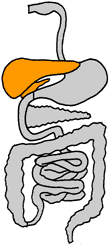 liver
liver
 O h, I k n o w t h i s !
O h, I k n o w t h i s !
I ' m a n e x p e r t o n
t h e l i v e r !
l i v e r
![]() The liver is located behind your lower ribs on the right side of your
abdomen. It weighs an average of three pounds and it is roughly the
size of a football.
The liver is located behind your lower ribs on the right side of your
abdomen. It weighs an average of three pounds and it is roughly the
size of a football.
![]() The liver has many important functions and they are: 1.) to convert
food into chemicals that are needed for you to survive. 2.) to
produce and transport important substances that are used by the rest of your
body. 3.) to process all the drugs absorbed from the digestive tract
into forms that are easier for the body to use; and 4.) to neutralize
(detoxify) and excrete substances that would be poisonous to your body. These
are only the four main functions of the liver.
The liver has many important functions and they are: 1.) to convert
food into chemicals that are needed for you to survive. 2.) to
produce and transport important substances that are used by the rest of your
body. 3.) to process all the drugs absorbed from the digestive tract
into forms that are easier for the body to use; and 4.) to neutralize
(detoxify) and excrete substances that would be poisonous to your body. These
are only the four main functions of the liver.
Oh... some other stuff YOU should really know...

Do you know how your liver plays a key role in converting food into essential chemicals of life?
![]() All the blood that leaves your stomach and intestines must pass through the
liver before heading off to the rest of the body. Therefore, it is logical
to have your liver as the body's "refinery" to process
nutrients and drugs. This is because the nutrients and drugs that are
absorbed into the blood around the stomach and the intestines which then in
turn passes through the liver.
All the blood that leaves your stomach and intestines must pass through the
liver before heading off to the rest of the body. Therefore, it is logical
to have your liver as the body's "refinery" to process
nutrients and drugs. This is because the nutrients and drugs that are
absorbed into the blood around the stomach and the intestines which then in
turn passes through the liver.
The liver play a principal role in removing toxins from the blood ingested and internally detoxifies toxic substances. Do you know how?
![]() Your liver's job is to convert the toxins into substances that can be easily
eliminated by the body. It also makes bile (a greenish-brown fluid)
which is very important for digestion. Bile is stored in the gallbladder
which, after you eat, contracts and discharges bile into the intestine, where
it helps digestion. The liver also chemically modifies many drugs taken to
treat diseases. These changes govern the drug's activity in the body.
Your liver's job is to convert the toxins into substances that can be easily
eliminated by the body. It also makes bile (a greenish-brown fluid)
which is very important for digestion. Bile is stored in the gallbladder
which, after you eat, contracts and discharges bile into the intestine, where
it helps digestion. The liver also chemically modifies many drugs taken to
treat diseases. These changes govern the drug's activity in the body.
These are some other cool functions of the liver that helps the body!
- Producing quick energy when it is needed.
- Manufacturing new body proteins.
- Preventing shortages in body fuel by storing certain vitamins, minerals, and sugars.
- Regulating transport of fat stores.
- Regulating blood clotting.
- Aiding in the digestive process by producing bile.
- Controlling the production and excretion of cholesterol.
- Neutralizing and destroying poisonous substances.
- Metabolizing alcohol.
- Monitoring and maintaining the proper level of many chemicals and drugs in the blood.
- Cleansing the blood and discharging waste products into the bile.
- Maintaining hormone balance.
- Serving as the main organ of blood formation before birth.
- Helping the body resist infection by producing immune factors and by removing bacteria from the bloodstream.
- Regenerating its own damaged tissue.
- Storing iron.
l i v e r q u i z
![]() Test your knowledge on the liver. Click on next to start the quiz, or move
on to the next section to skip the quiz.
Test your knowledge on the liver. Click on next to start the quiz, or move
on to the next section to skip the quiz.
back to top